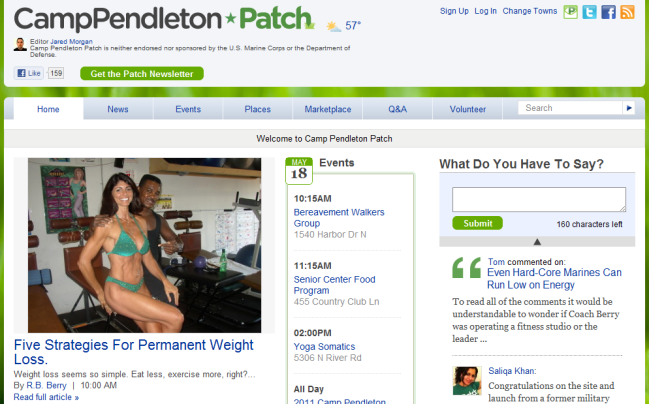 AOL has gone through some dynamic changes this year, and the effects of its HuffPo merger are still being felt. It’s becoming increasingly clear that the company is reconfiguring its news and media strategy, something CEO Tim Armstrong and head of content Arianna Huffington have at times been defensive of and at others surprisingly candid about – and often criticized for. But no matter the skepticism about its content reorganization, AOL’s intentions are anything but under the cuff – its going with the local trend or bust. In a press release, AOL announced it’s betting on Patch, its hyper-local news-forum platform. AOL plans to add 33 new Patch locations and is going on a hiring spree to fill contibutor positions.
AOL has gone through some dynamic changes this year, and the effects of its HuffPo merger are still being felt. It’s becoming increasingly clear that the company is reconfiguring its news and media strategy, something CEO Tim Armstrong and head of content Arianna Huffington have at times been defensive of and at others surprisingly candid about – and often criticized for. But no matter the skepticism about its content reorganization, AOL’s intentions are anything but under the cuff – its going with the local trend or bust. In a press release, AOL announced it’s betting on Patch, its hyper-local news-forum platform. AOL plans to add 33 new Patch locations and is going on a hiring spree to fill contibutor positions.
Patch has developed something of reputation when it comes to employment decisions. AOL’s announcement it would be hiring some 800 or so full-time Patch writers just after it announced yet another round of severe writing staff cuts. While that’s a legitimate concern for staff writers at the company who are seeing a swift shift to local content (and local freelancers with lower salaries), its AOL’s choice of Patch locations that’s more intriguing. The first new launch is Camp Pendleton, a military site in California, and its page is already up and running. The site is part of the Patch Military effort, which Huffington describes as a “particularly satisfying new offering” that focuses on the needs and interests of military families, most specifically the fact that many of them are constantly relocating. The consequence obviously being that the hyper-local trend is lost on many of them, something Patch is looking to directly conquer and capitalize on.
The Camp Pendleton site’s editor is Jared Morgan, a former US Marine who is also has a journalism and photography background.
Patch also plans to get political – without getting partisan. “Primary state Patches will empower citizens to consume and share election information in some of the most politically engaged areas of the country,” president of Patch Media Warren Webster says. According to AOL, Patch will act as a platform for political discussion and spur engagement rather than become a soapbox for specific parties. AOL has also announced it will be investing in its Patch Latino sites.
As if a dedicated site to your hometown weren’t hyper-local enough. AOL is banking on the success of Patch – in the past two years it’s invested approximately $115 million in the site and hopes to have 1,000 dedicated sites by 2012. While reaching out to a relocation-prone demographic definitely identifies a niche audience, it doesn’t necessarily seem like its earning potential justifies the money being poured into it.
What seems more lucrative is gearing up for the 2012 elections. Voters have taken to social networking and geo-location tools feverishly, and some sort of local-social or check-in element from Patch could be successful. That said, Foursquare and Facebook firmly dominated this market last time around, and we’re not so sure that’s going to change.
As for AOL’s more traditional content coverage, the site is under construction. “We’re in the middle of rebuilding the content operation and we’re moving as fast as we can. The goal is for every site to have a distinct identity, which wasn’t necessarily the case before,” Huffington told PaidContent earlier this week. The site is aiming to create “big newspages” about major news stories to try and lure readers in and keep them there for longer. And in this attempt, AOL will hire some notable writers and yes, pay them.
In response to controversy regarding the site’s dependence on upaid bloggers, Huffington said, “I think most people know what we’re about and I don’t worry too much about uninformed critics at this point.”


